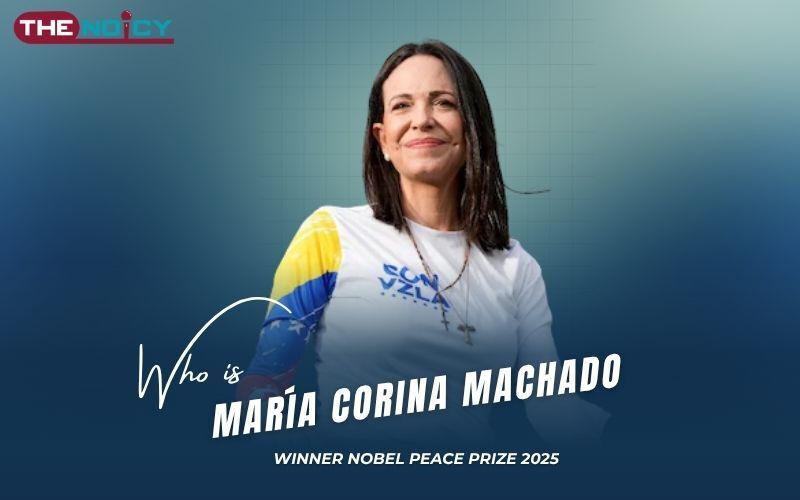María Corina Machado (born October 7, 1967, in Caracas, Venezuela) is a Venezuelan politician, industrial engineer, and human rights activist. She is best known as a leading figure in the Venezuelan opposition and a voice for democracy in her country.
In 2025, she was awarded the Nobel Peace Prize for her “tireless work promoting democratic rights for the people of Venezuela and for her struggle to achieve a just and peaceful transition from dictatorship to democracy.
Early Life & Education
- Machado comes from a well-to-do family: her father was a prominent businessman in Venezuela’s steel industry.
- She studied industrial engineering, earning her degree from Andrés Bello Catholic University (Venezuela).
- Later she also studied in administration and other fields to expand her skills in public affairs.
Her background in engineering and management gave her tools to analyze systems, structure ideas, and work on institutions — not just protest, but also building plans for change.
Political Journey & Activism
Founding Vote-Monitoring & Civic Work
Machado’s entry into public life began in civic organizations. In 2002, she co-founded Súmate, a Venezuelan group focused on election monitoring and citizen rights.
Her goal: make sure elections are fair, transparent, and that fraud or manipulation can be exposed. Over time, these efforts put her in direct confrontation with Venezuela’s ruling regimes.
Parliamentary Role & Removal
- In 2010, she was elected to Venezuela’s National Assembly with a record number of votes.
- She served in the National Assembly from 2011 to 2014
- However, in 2014, she was stripped of her seat under accusations by the government. Many observers regard this as a politically motivated action to silence her.
- During the large protests in Venezuela in 2014, she was a prominent leader in opposition demonstrations against President Nicolás Maduro’s government.
Running for President (and Being Blocked)
- In 2023, Machado won the opposition primary by a huge margin (over 90%) to become the unified candidate for Venezuela’s 2024 presidential election.
- But the Venezuelan government disqualified her officially from holding public office. Her candidacy was declared invalid by the Comptroller General, later upheld by the Supreme Court.
- Because she could not run, she threw her support behind Edmundo González Urrutia, who later claimed victory in the election.
Risks, Repression, and Staying in Venezuela
Because of her activism, Machado has faced serious danger:
- She has been accused by the government of conspiracy, treason, and other crimes.
- At times, she has had to go into hiding inside Venezuela to protect her life and freedom.
- Many of her senior advisers have been detained or forced into exile
- Despite all this, she has refused to flee permanently. Her staying is symbolic: she wants to lead from within, under pressure, rather than from exile.
Why She Won the Nobel Peace Prize
The Norwegian Nobel Committee explained that Machado “meets all three criteria stated in Alfred Nobel’s will. They cited:
- Bringing the opposition togethe — she helped unify different sectors of the opposition in Venezuela
- Resistance to militarisation — she has opposed the increased power of military forces in civil life.
- Peaceful transition commitment — she has been consistent in calling for nonviolent, democratic change
Also, the Nobel Committee specifically awarded her “for her tireless work promoting democratic rights … and for her struggle to achieve a just and peaceful transition from dictatorship to democracy.
Her victory signals global recognition of Venezuela’s crisis and the importance of nonviolent resistance in the face of authoritarian regimes.
Challenges & Criticisms
No public figure is beyond critique. Some challenges and criticisms associated with Machado:
- Her upper-class background has been a point of criticism. Some view her as less connected to Venezuela’s poorest.
- Some people accuse her of having extreme positions or being too confrontational.
- A segment of Venezuelans are wary or critical of her past statements, including some calls (in earlier years) for strong actions if the regime would not yield.
- Running a political movement under repression is extremely difficult. Her disqualification and legal obstacles show how flawed the system has become.
Even so, these criticisms do not override her courage in pressing on despite danger.
The Legacy She Wants to Leave
María Corina Machado hopes to leave behind:
- A peaceful but firm path away from dictatorship toward democracy in Venezuela
- Institutions that protect citizens’ rights, with strong checks and balances
- A renewed sense of unity among opposition groups, so divisions do not weaken the broader cause
- A model for other nations suffering under authoritarian regimes — that nonviolent, democratic resistance can be powerful
As Nobel laureate, she now carries greater international attention and responsibility.
What It Means for Venezuela & the World
- Venezuela has been in a prolonged crisis: economic collapse, humanitarian suffering, political repression. Machado’s award is symbolic for the Venezuelan people — a sign they are not forgotten.
- It sends a message to authoritarian regimes: the world still values democracy, rights, and peaceful change.
- It may strengthen international support, aid, and pressure on the Venezuelan government to open space for democracy.
- For activists globally, Machado becomes a beacon — showing that courage, discipline, and persistence matter.
Conclusion
María Corina Machado is not just a politician — she is a symbol of resistance, hope, and democratic aspiration in a country struggling under authoritarian rule. Her journey from engineering student to civic leader, from parliamentarian to targeted dissident, and now Nobel Peace Prize laureate, has been filled with danger, sacrifice, and unwavering belief in Venezuela’s potential.
Her story tells us:
- Democracy is not won overnight — it often demands decades of effort.
- Good leadership sometimes must risk safety and personal comfort.
- The world watches, and recognition can amplify the voice of the oppressed.
In awarding her the Nobel Peace Prize, the global community has acknowledged that her struggle is not Venezuela’s alone — it belongs to all those who believe in liberty, justice, and the power of peaceful change.




